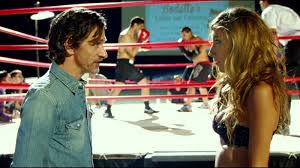
The glory of Christopher Nolan's desire to make 70mm movies with analog post-production is undercut by his readiness to splice in digital effects shots as needed when his "vision" fails to observe the constraints of the medium, not to mention his subtextual and mock-spiritual apologia (does the score allow any other interpretation?) for the transgressions of human progress.
Similar missteps have befallen P. T. Anderson, whose otherwise quite excellent Inherent Vice succumbed to digital trickery, less so his masterful The Master.
And Tarantino, for all his bold bluster, has used a digital intermediate on his last several films. I have to respect the logistics-defying ballsiness of bringing Ultra Panavision 70 out of its 50-year hibernation, but do closeups and interiors best demonstrate the awesome widescreen clarity of this format?
 |
Watching Rope with an attentive eye, we can of course pick out those mid-reel cuts, in a way we perhaps can't entirely in recent movies by Cuarón or Iñárritu, and yet we don't really trust those latter movies either. We know that those ostensible "shots" are pieced together "seamlessly" in a computer. How do we know that is not the case in Too Late? Only because it says so at the end of the movie. Pointedly, not because the image quality convinces us of anything. The film's digital intermediate provides no credence of its own, nor any color depth, for that matter. I'll concede the challenge of color-balancing shots that move indoors and out, sometimes in very low light, but I would gladly have brooked an ecstatically imperfect image that truly let shine the impressive feat this picture pulls off, and that would have made it a better candidate for the savior of 35mm.
And that is the position that we are in. Filmmakers who want to pull off a special-format or 35mm-exclusive release have to sell their film as essentially representative of the medium, an unfair standard that they typically can't meet. Too few films are made nowadays for the emergence of a surprise masterpiece.
In other news, the Silent Festival has announced its June lineup, and 40% of it (and counting?) is 35mm. That is far more than any other festival in town save Noir City and Elliot Lavine's (most recent) noir and pre-code events.
It may be too late for the present, but let us not lose the past!